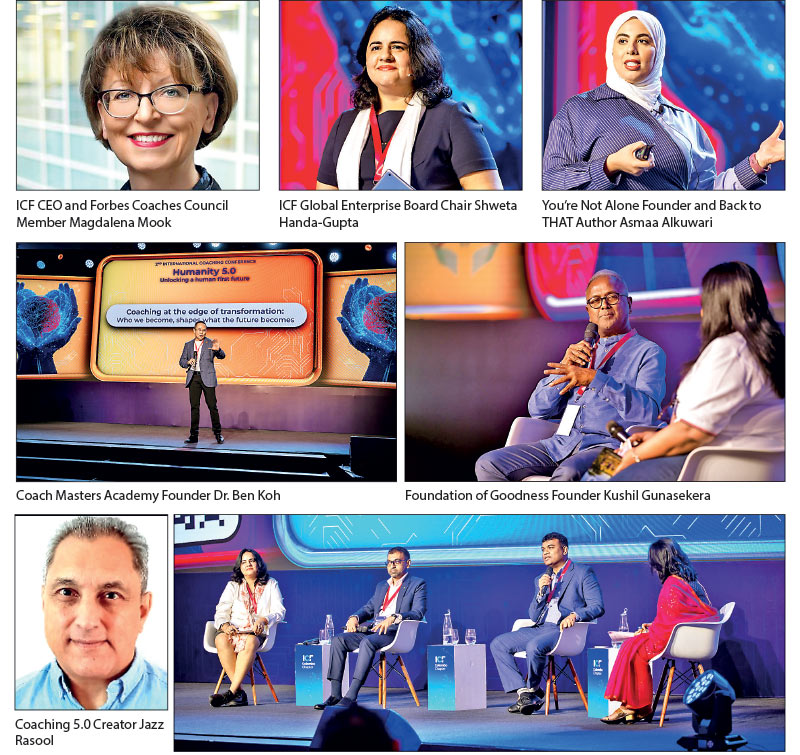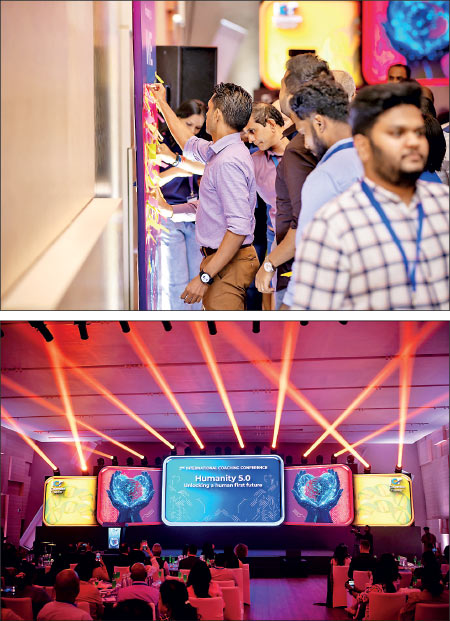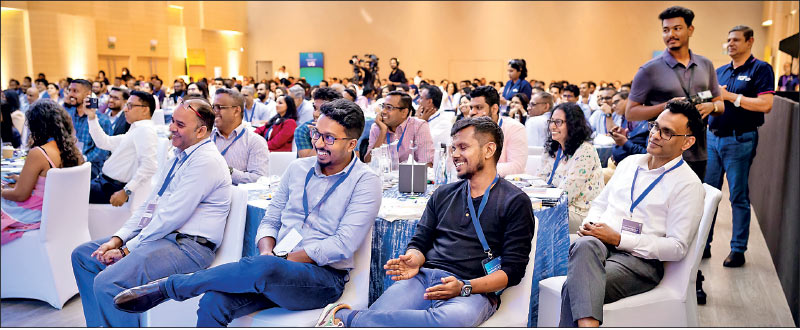Monday Feb 16, 2026
Monday Feb 16, 2026
Friday, 10 October 2025 00:10 - - {{hitsCtrl.values.hits}}


By Divya Thotawatte
 In an effort to unlock a human-first future, Sri Lanka’s Professional Coaching Conference was held recently for the second time, with a focus on keeping people at the centre of progress in a technology-driven world.
In an effort to unlock a human-first future, Sri Lanka’s Professional Coaching Conference was held recently for the second time, with a focus on keeping people at the centre of progress in a technology-driven world.
The conference, hosted by the International Coaching Federation (ICF), was themed ‘Humanity 5.0 – Unlocking a Human-First Future’. It was a two-day event of transformative conversations, interactive experiences, and global perspectives, with a curated lineup of local and international speakers who shared insight into emerging industry trends and opportunities.
Speaking virtually at the event, ICF CEO and Forbes Coaches Council Member Magdalena Mook said, “Humanity is what makes technology useful, not the other way around. As we embrace technology and other AIs, we must remember that the purpose of existence is to support human connection and development.”
She highlighted that against the rapid and incomprehensible state of the world, coaching brought clarity, measurable results, and a human-first approach to navigating complexity. The conference was therefore aimed at exploring how coaching could further empower teams and strengthen communities, while staying grounded in empathy, purpose, and connection.
The sessions were designed around three key impact areas:
Delivering the keynote address, National University of Singapore Department of Computer Science Associate Professor Suranga Nanayakkara urged participants to rethink the relationship between humans and technology. He outlined three barriers that prevented people from harnessing the full potential of technology.
The first was that digital technology did not match human behaviour. He recalled how he had once mistaken a Yahoo Messenger notification sound for a knock, making him question his capabilities. “But I realised what I did made sense. What do you want me to do when you hear a knocking sound? Look at the screen, or look at the door? Technology did not take my human natural behaviour into consideration.”
His second critique was that digital devices often purposefully demanded attention to the screen, distracting and disconnecting people from the world around them. As an alternative, he described proprioception experiments using the ear as a natural interface, allowing users to control devices with a simple touch while remaining present in their environment.
Finally, Nanayakkara reminded the audience that nearly everyone had some form of disability, whether it was a permanent impairment or situational limitation. Using his research on wearable technologies, like insoles that improve gym posture and devices that enabled deaf children to experience music, he highlighted how tech could empower rather than exclude.
Humanity 5.0 was a future where technology helped people become better versions of themselves, he noted, highlighting that, “It’s a subtle but significant shift of thinking technology not as a separated tool, but as an integrated extension of our body, mind, and behaviour.”
ICF Global Enterprise Board Chair Shweta Handa-Gupta was also a keynote speaker for the conference. She highlighted that the rapid evolution and development of technology brought opportunities as long as it ensured humanity remained at its centre.
“We are shaping a future where humanity itself will be the most important innovation. It will be our augmenter, it will be our tormentor,” she said, emphasising that the challenge was not to compete with machines, but to deepen what made us human. Urging the event’s participants to reflect on their role, she pointed to three qualities that technology could not replicate, which were human intelligence, emotional depth, and ethical leadership.
Handa-Gupta also warned against reducing human potential to mere efficiency, a trap seen too often in workplaces. “You can’t beat the machine at efficiency and productivity. Don’t even try that. But is that the goal? Do you want to be a better parent or a more efficient parent? Do you want to be a better lover or a more efficient lover?”
“The future depended on embracing technology without surrendering the essence of being human. The evolutionary goal was to become more magnificently human, supported by the machine,” she said.
Day 1 of the conference also featured other speakers like Coaching 5.0 Creator Jazz Rasool, Coach Masters Academy Founder Dr. Ben Koh, and Berlot Group CEO and CRR Global Faculty Executive Team Coach Linda Berlot.
Day 2 included a live coaching demo by EMCC Accredited Team Coach, ICF Mentor Coach and Regal United Founder Subash CV. The event also featured speeches by You’re Not Alone Founder and Back to THAT Author Asmaa Alkuwari and Foundation of Goodness Founder Kushil Gunasekera.
Panellists included Leadership Coach and Hult Ashridge Adjunct Faculty Dr. Mihirini De Zoysa, Shweta Handa-Gupta, Brandix CEO Ashroff Omar, and Deloitte Sri Lanka and Maldives Growth Office Leader Mayura Malagala.
